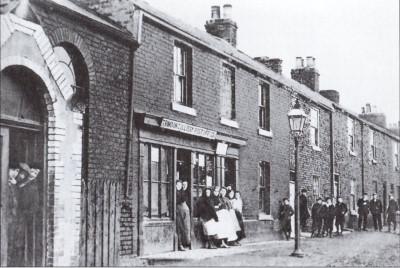THE BOLDEN BOOK
by Bob Dunn
As the North was not mentioned in The Doomsday Book of 1086, Hugh de Puiset compiled one in 1183. It is often called the Doomsday Book of the north and was the first survey of the north of the Tees - the area that was left out of the Doomsday Book. In the Bolden Book Garmondsway is mentioned as 5 bovates which belonged to Ralph Haget and which the bishop holds by his forfeiture and they yield 16s. 8d. and ten hens with one hundred eggs. And there the bishop has 4 bovates by his own purchase which lie waste. In the Bolden book Trimdon is listed. The prior and Canons of Guisborough hold Trimdon in free, pure and perpetual alms, exempt from all payments and services for ever.
It is thought that the North was left out of the Doomsday Book because King William did not find Northern folk friendly.

The Square. Next to the Post Office was the Reading Room which had been the First Primitive Methodist Church.
CHOLERA IN SOUTH DURHAM
"The cholera has been very fatal in a colliery village named Trimdon, situated between the Ferryhill station of the York and Berwick railway and Hartlepool. It broke out very suddenly on Saturday fortnight and since then 14 deaths have taken place. Between 40 and 50 persons have been attacked with the disease in a bad form since its outbreak. Some of the deaths have been awfully sudden and without those premonitory symptoms that have previously marked the early stages of this terrible disease. The principal portion of the village is on a hill, and is rather favourably situated for sanitary arrangements, though there is a burning and sulphurous pit heap not far from that row. The disease has been most fatal among the least prudent, and hence poorer portion of the pitmen, though temperate regular living persons have fallen victim to it also. On Sunday evening week a Primitive Methodist local preacher, a pitman, conducted divine service in the chapel in that place and afterwards took a walk into the fields with his wife. He went to bed apparently in good health, about midnight he was attacked with cholera, in four hours he was dead. There was one death on Mon-day, and the medical men state the disease is quite epidemic. It is supposed to arise from some local cause not yet discovered, for, though surrounded by other large villages, no cases of cholera have been reported in them. Great complaints have been made with regard to the supposed negligence of the General Board of Health in London. Immediately upon the appearance of the epidemic in the village, Mr. Hood, the viewer and manager at the colliery, wrote to the proper authorities in London, informing them of the circumstances. Down to Saturday night no answer had been received by Mr. Wood. The cases have been attended to by Mr. Scott, the colliery surgeon, his assistant Mr. Gordon, and Mr. Haddock the union surgeon. The colliery surgeons instituted a house to house immedi-ately upon the appearance of the disease".